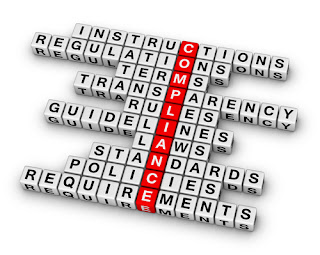Why You Need to Update Your Social Media Policies Now and Tips for Getting Started
If you don't have a social media policy, you need to create one. If you already have one, kudos, and you mostly likely need to update it. Social media policies protect both the organization and its employees by defining what behavior is acceptable online. So why do you need to update it? Three reasons. First, because social media is used for business which means the Federal Trade Commission (FTC) has passed laws that impact what brand employees are allowed to do with respect to other brands online. Second, because brands have tried to control employee use of social media which has, in some instances, led to employees being disciplined. This, in turn, has made the National Labor Relations Board (NLRB) scrutinize what is fair and proper conduct by employers with regard to social media policies. Third, because the social media landscape changes rapidly. As new technologies, and usage scenarios emerge, regulatory agencies change laws, and brands need to revise their policies to make sure they are effective, and legal.
What is a social media policy? It’s becoming more than you may have thought

As stated above, social media policies define what employees are allowed to do on Social Media, with respect to the organization they work for. They are essentially a code of conduct for online interaction. Social media policies are necessary because they protect the organization in the event an employee posts something that can be damaging to the brand or its reputation. They protect employees by providing guidance about types of actions are proper and allowed with regards to social media. Good policies also empower employees to post content and interact on behalf of their brands, which is generally of great benefit to the brand. It increases reach, and employee brand advocates are commonly more trusted than brand voices.
Social media policies, and what they seek to govern, are expanding. Organizations are increasingly providing guidelines for how their employees are supposed to act as a private person when on social media. Ernie Smith, in an article published in Associations Now, made the point that organizations are becoming more likely to discipline employees for misuse of social media, either at work or at home. When you consider that the FTC and NLRB are watching as well, social media polices, and the employee training surrounding them, aren't so simple any longer. An organization's policies and their enforcement of them is complex activity that deserves regular and thoughtful attention.
Some common issues with social media policies

That same Associations Now article stated that “78% of organizations in the survey have some sort of policy in place, and 52% have policies that apply to both work and personal usage.” So the number of policies have increased overall as organizations have realized the need. Many studies show (and we’ve seen this in our own experience with customers) that social media polices are often outdated or have other issues such as the following:
- The policies are based on Public Relations (PR) policies. While PR policies are often a good start, they don’t take into account the speed, viral nature, or access to the Internet.
- Policies aren’t updated frequently enough. FTC and NLRB decisions should be reviewed as they are made, and polices should be updated accordingly. Policies should be reviewed in their entirety every quarter.
- Many policies may not take new social networks or technologies into account. In this context the old question, “if a tree falls in the forest an no-one is there to hear it, does it make a sound,” translates to “If I say something inappropriate on Snapchat, and wait 10 seconds did it really happen?” The answer is yes, if someone takes a screenshot. Ensuring that policies explicitly mention networks on which the brand has a presence can act like an ounce of prevention. It can make employees think twice about something before doing it.
- They don’t expressly mention the corporate privacy policy. Many organizations get in trouble over this specific issue by releasing employee or customer privacy data on social media. While many social media polices focus on actions, they don't include or link to the corporate privacy policy. A simple sentence that says 'this is our privacy policy - read it, and don’t release privacy information on social media' is all it takes.
- They don’t address social media usage or commentary after employees have left the company. This is a new and emerging field of study, policy, and law and is becoming a concern for organizations because former employees may have sour grapes, or may just become relaxed about what they say about the brand, working conditions, products, or services. It's something that policies need to cover.
- Recruiting legal issues. This is another emerging field of study, policy, and law, and it’s even murkier. 94% of recruiters and organizations use social media to recruit. In doing so, they often see images, posts, and other data that most people might consider private, or even intimate. Potential employees are no longer just putting their best foot forward in a resume and a series of interviews. Recruiters and HR people will find and review social media accounts. Where are the lines? Each organization has to decide that for themselves and create policies accordingly. What's legal and proper? That’s still being worked out.
- Not training their employees. This is perhaps the biggest universal shortcoming. Social media polices are often treated like the employee handbook. Once it’s made, they distribute a link to it, and have the employee check a box saying they’ve read it. But social media isn’t like the employee handbook. Social media can make bad things go viral, costing time and money to respond to, and causing damage to the brand or its reputation. Yes, you can fire an employee if they violate the policy, but if they’ve damaged your brand’s reputation, a lot of profits might walk out the door with them. Organization’s need to make employee social media policy training mandatory, annual, and part of the onboarding process. It needs to be real training, not a checkbox.
What’s the FTC got to do with social media?

The Federal Trade Commission’s mission is to “To prevent business practices that are anti-competitive or deceptive or unfair to consumers.” In short, they work to keep
a level playing field for businesses, and make sure consumers get accurate information. There are many ways this comes into play on social media particularly around disclosures and endorsements. To play fair, relationships must be disclosed so that people know which information is coming from a competitor or affiliate of a competitor. If you are paid by a brand and then endorse a product or service, that should also be disclosed. Then, there are Children’s Online Privacy Protection Act (COPPA) regulations. All of these impact social media in a number of ways that should be considered when creating policies. Here are some common situations where FTC regulations come into play:
- Online reviews and comments. Employees of a brand are not supposed to post negative comments of competitor’s products and services without disclosing who they work for. Sony recently got in trouble for this as this Marketingland article points out. This is something that needs to be in your policy, and that your employees should be trained on.
- It goes further than that. Are you a blogger, or does your company have a partner affiliation where you receive free samples? If you then endorse those samples, you may need to disclose that. The FTC endorsement guideline Example 8 walks through some scenarios.
- Do you clearly state that your ads are ads? Maybe, maybe not. The FTC just cracked down on Twitter ads. SHIFT Communications published a good article with proper and improper examples of what the FTC expects to see. From their article, “the golden rule is: if money is changing hands, obvious disclosure must occur in-ad.”
- You can make all the ads you want that go after your competitors. You cannot, however, target a competing brand and make it look like organic conversations. An iDigitalTimes article details how Samsung just got fined for doing this.
Needless to say, your organization needs to review the guidelines, be familiar with the scenarios, and define appropriate conduct for your organization, and its employees in the social media policy.
The NLRB is cracking down on social media polices

The National Labor Relations Board “protects the rights of employees to act together to address conditions at work, with or without a union. This protection extends to certain work-related conversations conducted on social media.” How does the NLRB come into play? In two ways. If an organization takes action against employees for discussions they have on social media, the NLRB may get involved to see if those conversations were protected - see the board decisions section of this NLRB fact sheet for examples. More importantly, starting in 2012 the NLRB started taking an interest in when employers could limit employees’ use of social media. The NLRB wants social media policies to be clear, and enforcement of those policies, when it comes to employee discipline for social media misuse, to be lawful. EmSpring has written a good brief summarizing the guidelines. The sections on Unlawful Social Media Polices and Acceptable Social Media Policies are particularly informative. It’s also a good idea to review some of the recent NLRB actions in this area. The National Law Review recently published an article which details several cases. When crafting or updating your social media policies you should always review NLRB social media guidelines.
Help creating new, or updating existing social media polices

This is a complex discussion, and, as I stated earlier, the landscape is constantly changing. Fortunately there are some very good resources, in addition to the ones linked to above, that can help you put good policies in place. These include:
- SocialMedia.org Disclosure Toolkit: This free, online toolkit provides a series of checklists based on scenarios from disclosure of identity, to creative flexibility, to general best practices. The checklists provide a great starting point creating policies.
- Social Media Today has put together a list of over 100 Examples of Social Media Policies that you can review and draw upon to craft and update your policies.
- Fast Company published a very good article where they compare and contrast different brand’s social media policies, especially those that apply to employee social media use as private people. This is worth the read. I think you’ll be surprised at how simple some of these polices are, and how deep they reach into private use of social media.
Too much? Get some help
If this is too much for you, consider hire a social media consultancy to help. Find one that has experience helping clients create social media policies, and that has relationships with lawyers experienced with social media legal matters.
Over to you
I've you've had an issue either creating or updating your policies, or enforcing them, I'd love to hear about it in the comments.